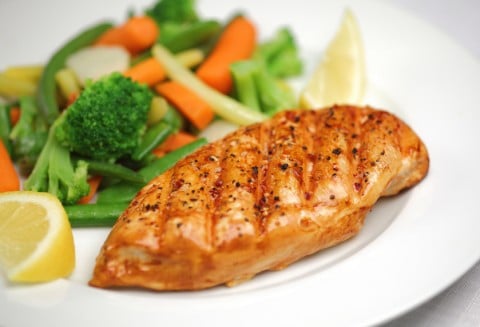 How Much Protein Do I Need?
How Much Protein Do I Need?
Probably more than you think! Protein makes up muscle and muscle is what makes the body go. To some degree, your quality of life and your ability to carry out activities of daily living depends on how much muscle you have. That’s why eating enough protein is so important. We have about 620 muscles in the body that allow us to move and help keep us upright, and muscle makes up 43% of a man’s body weight and 34% of a woman’s body weight. So a pretty big chunk of your body is protein.
The body primarily burns fats and carbohydrates and only sparingly burns protein for energy. Protein is reserved for other purposes – making muscle and connective tissue, enzymes, hormones, and much more.
Daily Protein Requirement
Below is a simple method to determine your daily protein requirement. To calculate your daily protein requirement you need to know how much lean body mass you have or what is called your fat-free mass. Most adults are somewhere between 20% and 30% body fat so if you don’t know your lean body mass you can plug in one of those numbers to get a close approximation for your daily protein requirement.
Take your body weight and multiply that by your percentage of lean body mass. So if you weigh 160 pounds and have 20% body fat then your lean body mass is 80%. 160 times 0.8 = 128 pounds of lean body mass. Fat does not need protein so that’s why it is excluded from the equation.
You then multiply your lean body weight in pounds by your “protein need factor”. The protein need factor is based on your activity level as follows:
- Need factor of 0.5 = means you are sedentary
- Need factor of 0.6 = means you engage in light fitness
- Need factor of 0.7 = means you perform moderate exercise three times a week
- A need factor of 0.8 = means you engage in daily moderate-weight training or aerobic training
- A need factor of 0.9 = means you do heavy-weight training daily
- A need factor of 1.0 = means you are doing sports training and daily heavy-weight training or doing two a day.
So if our 160 pounder with a lean body mass of 128 pound has a need factor of 0.8 then his daily protein requirement is 128 times 0.8 or 102 grams of protein a day. Those 102 grams of protein should be consumed somewhat evenly throughout the day in 5-6 meals or snacks. A good rule of thumb is to consume 25 to 35 grams of protein per meal or snack. That will cover the protein needs for most of us.
What are the Best Sources of Protein?
The following are good sources of protein. The amount of protein (in grams) they provide is based on a standard serving.
- Cottage cheese (1/2 cup) 15 grams
- Large egg with yolk 6 grams
- Egg white 3 grams
- Plain Greek yogurt (8 oz) 16 grams
- Skinless chicken (5 oz) 30 grams
- Skinless turkey (4 oz) 32 grams
- Lean cuts of beef (4 oz) 35 grams
- Pork chop (4 oz) 25 grams
- Lamb (4 oz) 30 grams
- Lobster (4 oz) 24 grams
- Bass (4 oz) 27 grams
- Canned tuna (6 oz) 39 grams
- Fresh tuna (4 oz) 34 grams
- Shrimp (4 oz) 24 grams
- Wild salmon fillet (5 oz) 35 grams
- Red snapper (4 oz) 32 grams
Are you meeting your daily protein requirement?
